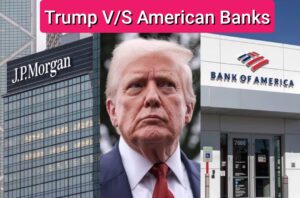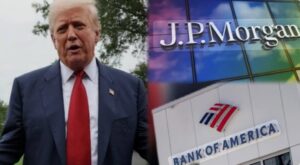Trump Vs American Banks as Trump Targeting JPMorgan and Bank of America
Trump Vs American Banks : Why Donald Trump is Targeting Big Banks Like JPMorgan and Bank of America ? In this article we will understand the whole issue in the details.
What is the context of the Trump Vs American Banks Controversy?
U.S. President Donald Trump has launched a fresh attack — not on foreign countries, media, or universities — but on American banks.
Specifically, JPMorgan Chase and Bank of America are in his crosshairs.
Trump says these financial giants refused to do business with him after he left the White House in 2021.
His comments have sparked a larger debate about whether U.S. banks are politically biased and how financial regulations are being used.

Trump’s Claims: Banks Closed His Accounts
According to Trump, JPMorgan gave him just 20 days to close his account, even though he’d been banking with them for over 35 years.
This likely happened soon after the January 6 Capitol riots, when Trump was facing heavy backlash after losing the 2020 election.
Trump also claims that Bank of America refused to open a new account for him. He mocked the bank’s CEO, Brian Moynihan, saying he was friendly when Trump was president but changed his tone after Trump left office.
Fact: JPMorgan Chase is the largest bank in the U.S., with assets over $3.9 trillion. Bank of America is the second-largest, with over $3 trillion in assets.
Trump Vs American Banks : Is It Political Bias or Compliance Rules?
Many conservatives have accused banks of discriminating based on political beliefs. They argue that banks avoid doing business with right-leaning individuals or companies like:
- Gun manufacturers
- Oil and gas firms
- Crypto-related businesses
Even Melania Trump claimed in her book that her personal account was closed, and the bank also refused to open an account for her son Barron Trump.
However, banks deny any political bias. They say the issue is about regulations, not politics.
Explanation: In the banking world, people like former presidents or politicians are labeled Politically Exposed Persons (PEPs). Banks are required by law to monitor these accounts more closely to prevent money laundering or corruption.
This means more paperwork, stricter rules, and higher compliance costs. Some banks may choose to avoid high-profile clients like Trump to reduce risk and legal exposure.

Trump’s Response: An Executive Order Against Banks led to Trump Vs American Banks New War
Trump says he’s had enough. If he becomes president again, he plans to sign an executive order forcing banks to:
- Review how they handle politically exposed clients
- Reduce what he calls unfair compliance actions
- Ensure banks aren’t shutting accounts based on political views
Impact: Such a policy could change how banks operate and make it harder for them to turn away controversial figures. However, it could also increase risk and reduce internal controls that help prevent financial crimes.
Banks Are Lobbying Behind the Scenes
American banks have taken Trump’s warning seriously. Over the past few months, top officials from JPMorgan, Citibank, and Wells Fargo have been holding private meetings with Republican lawmakers in states like:
- Texas
- Oklahoma
These states have threatened to cancel state contracts worth billions of dollars if banks are found to be discriminating against gun makers or fossil fuel companies.
Fact: States like Texas manage large public funds (pensions, contracts) and often work with big banks. If they pull out, it would hurt these banks financially.
A Pattern in Trump’s Strategy
This isn’t the first time Trump has taken on powerful institutions. Over the years, he has openly criticized:
- Universities
- Law firms
- Media houses
Now, banks are his new focus — especially those he feels abandoned him when he was politically vulnerable.
Economic Viewpoint: Trump’s strategy appeals to many voters who feel that large institutions, including banks, are too powerful, politically biased, or out of touch with ordinary Americans.
Politics, Banking, and the Battle Ahead
Donald Trump’s fight with JPMorgan and Bank of America is more than a personal issue. It highlights a growing conflict in the U.S. between politics and big business.
If Trump’s executive order goes ahead, it could reshape how banks handle high-risk clients, especially those involved in politics. On the other side, banks may need to choose between following strict regulations or facing political backlash.
In either case, this battle between Trump and Wall Street could have serious consequences for banking policies, state contracts, and financial regulations across America.
Read Also: Boycott America Trend across the world amid Trump’s Tariff tantrums
